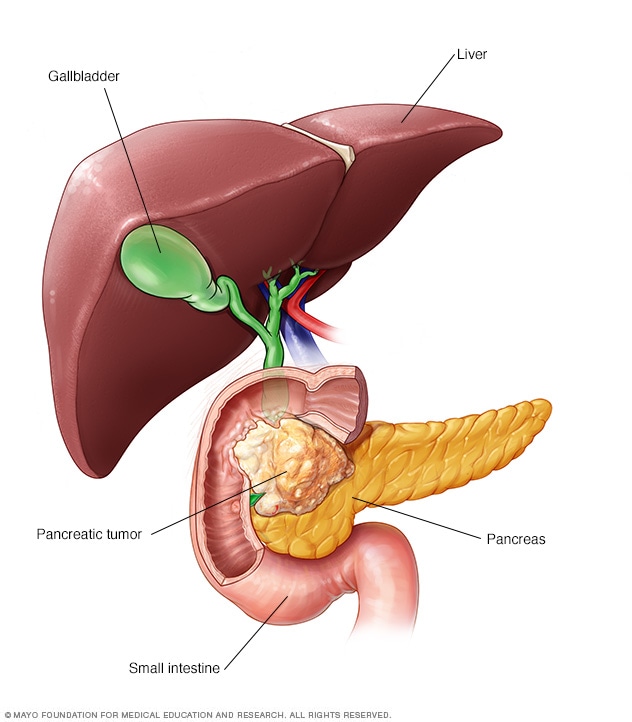Liver Cancer and Pancreatic Cancer
Hepatoblastoma (Liver Cancer)
Cancer is uncontrolled cell division when new cells are not needed. A tumor forms from the extra cells. Tumors can be benign, but malignant tumors spread to other tissues and parts of the body. Liver cancer is rare, and may form after a hepatitis infection or exposure to toxic chemicals. In adults, it may also be caused by lifestyle factors like alcohol or tobacco use. Hepatoblastoma liver cancer may develop in young children. Possible symptoms of liver cancer include loss of appetite, weight loss, and pain or swelling in the abdomen. Learn about diagnosis, stages, and treatment.
Topic: Liver cancer Language: English Lexile: 1280 http://www.chp.edu
Rarely detected in the early stages, pancreatic cancer spreads quickly from the small organ behind the stomach. By the time it is found, it may be impossible to remove it all surgically. Symptoms of pancreatic cancer may include upper abdominal pain, jaundice, and weight loss. Find out how the pancreas works and how pancreatic cancer forms. Explore risk factors that include race, weight, pancreatitis, smoking, and genetic factors. Pancreatic cancer can block liver bile or undigested food from reaching the intestines.
Topic: Pancreatic cancer Language: English Lexile: 1340 http://www.mayoclinic.org
Hepatocellular Carcinoma
Occurring most frequently in people over 50, hepatocellular carcinoma is the most common type of cancer than originates in the liver. Metastatic liver cancer starts in other organs and then spreads to the liver. Hepatocellular carcinoma is usually caused by cirrhosis or scarring associated with alcohol abuse, hepatitis, autoimmune conditions, or hemochromatosis. Abdominal pain or enlargement as well as jaundice and frequent bruising may indicate a liver problem like hepatocellular carcinoma. This condition is usually not diagnosed early, making prognosis poor even with aggressive treatment.
Topic: Liver cancer Language: English, Spanish Lexile: 940 http://www.nlm.nih.gov
Starving Pancreatic Cancer Before It Has a Chance To Feast
Hard to detect and treat, pancreatic cancer has a low survival rate. Like any other tissue in the body, cancer can only thrive with its own blood supply. The blood vessels in cancer are leaky, making it hard to reach cancer with drugs in the bloodstream. Scientists at the University of Kansas are studying a protein involved in angiogenesis in pancreatic cancer. This protein promotes blood vessel growth and increases the migration of endothelial cells. Targeting this protein could slow down the growth of this aggressive form of cancer.
Topic: Pancreatic cancer, Angiogenesis Language: English Lexile: 1400 http://www.kucancercenter.org
What Everyone Should Know. . .There is Always Hope!
The basic facts about pancreatic cancer are presented at the John Hopkins University web site. The opening page has important details about the disease including which people are at the greatest risk for the disease and the difficulty of diagnosing it. The link to frequently asked questions provides facts about the pancreas, the causes of pancreatic cancer, how it is diagnosed and how it spreads. Hereditary factors and various treatment and care options are discussed.
Topic: Pancreatic cancer Language: English Lexile: 1830 http://pathology.jhu.edu
- EResources
- Ebooks
- Contests and Opportunities
- Faculty Resources
- Library Good Reads
- GradPoint (opens in new window)
- LibGuides
- NHS Library Seminars (opens in new window)
-
Historical Links
- Immigrant Groups in the West
- Immigrant Groups in the West Making the Connections
- Immigration Symbols
- Immigration West
- Industrial Revolution Resources List
- Industrialists
- Korean War
- Legacy of Jim Crow
- The 60's
- Women and the Industrial Revolution
- Working Women and the Industrial Revolution
- Working Women During the Industrial Revolution
- Against Slavery
- Immigration
- Louis Braille An Exceptional Man
- MLA and APA Style Guides
- Norwood High School Home
- Quick reference
- Research & Instruction
- Summer Work
- Textbooks
This site provides information using PDF, visit this link to download the Adobe Acrobat Reader DC software.

